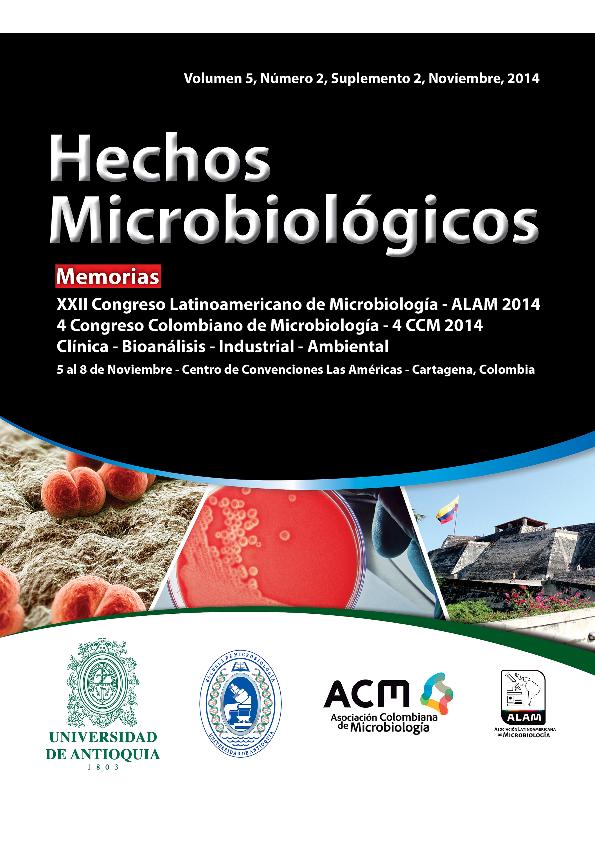Mostrar el registro sencillo del ítem
dc.contributor.author
Polti, Marta Alejandra

dc.date.available
2023-04-24T14:29:27Z
dc.date.issued
2014
dc.identifier.citation
Anaerobic Sulfate-reducing Bacteria in a Copper Filter Treatment System; XXII Congreso Latinoamericano de Microbiología; Cartagena; Colombia; 2014; 1-2
dc.identifier.issn
2145-8898
dc.identifier.uri
http://hdl.handle.net/11336/195144
dc.description.abstract
Remediation technologies involve any operation that decrease toxicity, volume, or mobility of hazardous waste or pollutants by the use of physical, chemical and / or biological processes. Bioremediation has advantages over conventional treatments, allowing mineralization or conversion into harmless substances of a variety of contaminants; also, it can be applied at the affected site, has low installation and operating costs, is easy to use and technologically effective. Different microorganisms, viable or not, and / or cellular components may be used in these processes. The metallurgical and mining industries are the main source of heavy metal pollution of rivers and lakes. It is imperative to remove metals from their effluents. Microorganisms can change the redox state of metals such as Cu, by direct (enzyme) or indirect processes (through reduction of iron sulfate reduction / sulfur or sulfur oxidation), therefore, a key factor that decides applying bioremediation strategies is the bioavailability of an electron donor that can be used in metal reduction. Sulfate reducing bacteria are able to catalyze, under anaerobic conditions, the sulfate reduction using organic compounds as electron donors, producing the bioprecipitation of metal as sulfides, which generally are stable solids. However, this process is influenced by the presence of other pollutants, metals or organic, in watercourses, which affect the acidity of the medium. In addition, sulfate-reducing bacteria are strictly anaerobic and usually are very sensitive to environmental oxygen, dying after exposition. In oxygenated environments, like the surface of water bodies and neighboring sediments, aerobic microorganisms can be used to complement the process. Actinobacteria are aerobic prokaryotic organisms. Their metabolic diversity and particular growth characteristics, mycelial form and relatively rapid colonization of selective substrates, indicate them as well suited agents for bioremediation of metal and organic compounds. They can reduce or uptake metals. A combination of treatments will ensure a successful process.
dc.format
application/pdf
dc.language.iso
eng
dc.publisher
Universidad de Antioquia
dc.rights
info:eu-repo/semantics/openAccess
dc.rights.uri
https://creativecommons.org/licenses/by-nc-sa/2.5/ar/
dc.subject
Anaerobic
dc.subject
Copper
dc.subject.classification
Bioremediación, Diagnóstico Biotecnológico en Gestión Medioambiental

dc.subject.classification
Biotecnología del Medio Ambiente

dc.subject.classification
INGENIERÍAS Y TECNOLOGÍAS

dc.title
Anaerobic Sulfate-reducing Bacteria in a Copper Filter Treatment System
dc.type
info:eu-repo/semantics/publishedVersion
dc.type
info:eu-repo/semantics/conferenceObject
dc.type
info:ar-repo/semantics/documento de conferencia
dc.date.updated
2023-03-02T15:35:46Z
dc.journal.volume
5
dc.journal.number
2
dc.journal.pagination
1-2
dc.journal.pais
Colombia

dc.journal.ciudad
Antioquia
dc.description.fil
Fil: Polti, Marta Alejandra. Consejo Nacional de Investigaciones Científicas y Técnicas. Centro Científico Tecnológico Conicet - Tucumán. Planta Piloto de Procesos Industriales Microbiológicos; Argentina. Universidad Nacional de Tucumán. Facultad de Ciencias Naturales e Instituto Miguel Lillo; Argentina
dc.relation.alternativeid
info:eu-repo/semantics/altIdentifier/url/https://revistas.udea.edu.co/index.php/hm/article/view/21416/17752
dc.conicet.rol
Autor

dc.coverage
Internacional
dc.type.subtype
Congreso
dc.description.nombreEvento
XXII Congreso Latinoamericano de Microbiología
dc.date.evento
2014-11-05
dc.description.ciudadEvento
Cartagena
dc.description.paisEvento
Colombia

dc.type.publicacion
Journal
dc.description.institucionOrganizadora
Asociación Lationamericana de Microbiología
dc.source.revista
Hechos Microbiológicos
dc.date.eventoHasta
2014-11-08
dc.type
Congreso
Archivos asociados
